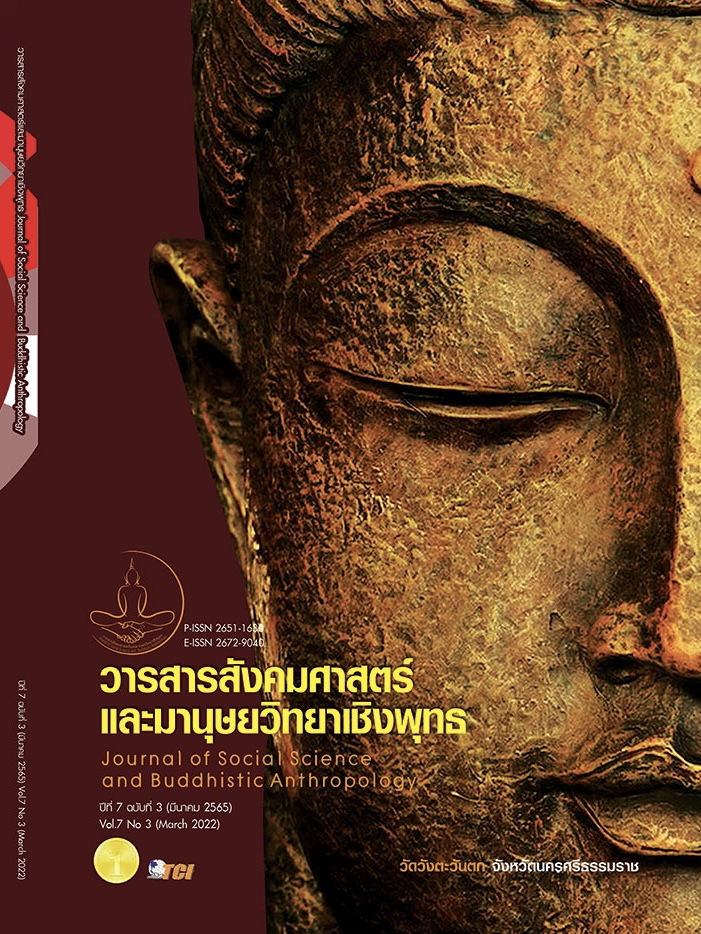A DEVELOPMENT OF LESSON PLANS TO DEVELOP RESEARCH SKILLS FOR PRESERVICE TEACHERS MAJORING IN HOME ECONOMICS
Keywords:
Lesson Plan, Research Skill, Home Economics, Preservice TeachersAbstract
The objectives of this research article were to create lesson plans to develop research skills for preservice teachers majoring in Home Economics and to examine the outcomes after the implementation of the lesson plans. It was developmental research consisting of 4 phases: 1) exploring concepts and theories, 2) developing lesson plans, 3) implementing the lesson plans, and 4) revising the lesson plans. The samples derived from purposive sampling were 84 fourth-year students majoring in Home Economics at the Rajamangala University of Technology Krungthep. As the results of the research, 7 lesson plans with a total of 52 class hours to develop research skills for preservice teachers majoring in Home Economics hours were evaluated by experts. Overall, the lesson plans received a very good evaluation score (M = 4.34, S.D. = 0.48). The average score of the learning activities was in the very good range (M = 4.51, S.D. = 0.40). As for the learning objectives, the average score was also in the very good range (M = 4.43, S.D. = 0.57). In terms of the learning units, the average score was in the very good range (M = 4.25, S.D. = 0.63) และ 2) The outcomes after the implementation of the lesson plans, when considering the research quality revealed that the overall achieved the average score in the very good range (80.50%). The top 3 highest average scores were 1) methodology (88.10%) 2) identifying problems (83.25%) and 3) introduction (82.64%). As for the attitudes of the learners, it was found that the learners had good attitudes in general (M = 3.93, S.D. = 0.89). The significance of the study was given the average score in the high range (M = 4.02, S.D. = 0.86), and the attitudes toward classroom research were given the average score in the high range as well (M = 3.92, S.D. = 0.87).
References
กระทรวงศึกษาธิการ. (2542). พระราชบัญญัติการศึกษาแห่งชาติ. พ.ศ. 2542 และที่แก้ไขเพิ่มเติม (ฉบับที่ 2) พ.ศ. 2545. กรุงเทพมหานคร: โรงพิมพืคุรุสภาลาดพร้าว.
จุฑา ธรรมชาติ. (2560). ผลการสอนปฏิบัติการตามแนวคิดวิจัยเป็นฐานที่มีต่อทักษะพื้นฐานทางการวิจัย และเจตคติต่อการวิจัยของนักศึกษาคณะศึกษาศาสตร์ มหาวิทยาลัยสงขลานครินทร์ วิทยาเขตปัตตานี. วารสารวิทยบริการ มหาวิทยาลัยสงขลานครินทร์, 7(2), 64-72.
บุญชม ศรีสะอาด . (2550). วิธีการทางสถิติสำหรับการวิจัย. กาฬสินธุ์: โรงพิมพ์ประสานการพิมพ์.
ภัทราพร เกษสังข์ และคณะ. (2561). สมรรถนะและการประเมินความต้องการจำเป็นเพื่อพัฒนาวิชาชีพครูในศตวรรษที่ 21 ของครูกลุ่มสาระการเรียนรู้สังคมศึกษา ศาสนาและวัฒนธรรมจังหวัดเลย. วารสารวิจัยมหาวิทยาลัยเทคโนโลยีราชมงคลศรีวิชัย , 11(1), 132-145.
วิจารณ์ พาณิช. (2552). การศึกษาองค์ความรู้เกี่ยวกับคุณลักษณะของคนไทยที่พึงประสงค์: เชาวน์ทางปัญญา. กรุงเทพมหานคร: สำนักงานเลขาธิการสภาการศึกษา.
สมชัย เทพสมบัติ และคณะ. (2563). ยุทธศาสตร์การพัฒนาสมรรถนะด้านการวิจัยของครูในวิทยาลัยครูปากเซสาธารณรัฐประชาธิปไตยประชาชนลาว. วารสารสันติศึกษาปริทรรศน์ มจร , 8(4), 1380-1393.
สายฝน แสนใจพรม. (2564). การพัฒนาความสามารถด้านการวิจัยของครูที่ใช้ภูมิปัญญาท้องถิ่นเพื่อส่งเสริมทักษะการคิดวิเคราะห์. วารสารวิจัยราชภัฏ, 22(1), 133-148.
สำนักงานคณะกรรมการวิจัยแห่งชาติ. (2561). (ร่าง) ยุทธศาสตร์การวิจัยและนวัตกรรม 20 ปี (พ.ศ. 2560 - 2579). กรุงเทพมหานคร: บริษัท โคคูน แอนด์ โค จำกัด.
สุรศักดิ์ แซ่เอี้ยน และคณะ. (2559). การศึกษาอิทฺธิพลของความสามารถในการวิจัย แรงจูงใจในการทำวิจัย และกระบวนการสนับสนุนจากโรงเรียนต่อความต่อเนื่องของการวิจัยของครู: การประยุกต์ใช้โมเดลพื้นผิวการตอบสนอง. วารสารวิธีวิทยาการวิจัย, 29(2), 157-181.
สุวิธิดา จรุงเกียรติกุล. (2558). การนำเสนอแนวทางการจัดการศึกษาตลอดชีวิตเพื่อขับเคลื่อนชุมชนการเรียนรู้ในบริบทสังคมและวัฒนธรรมของประเทศไทย. กรุงเทพมหานคร: จุฬาลงกรณ์มหาวิทยาลัย.
Anwaruddin, S. M. & Pervin, N. (2015). English-language teachers’ engagement with research: findings from Bangladesh. Professional Development in Education, 41(1), 21-39.
Barrows, H. S. (2000). Problem based learning applied to medical education. Springfield IL: Southern Illinois University Press.
Billings, E. et al. (2013). Teaching with the Mathematical Practices in Mind. Mathematics Teaching in the Middle School, 19(2), 100-107.
Breckler, R. L. (1986). The Social Work Dictation (3rd.). Washington DC: Nasw Press.
Ferrance, E. (2000). Action research. Retrieved Dec 15, 2019, from http://www. alliance.brown.edu
Good, C. V. (1973). Dictionary of Education. New York: McGraw-Hill Book.
Locke E. A. & Latham, G. P. (1990). A Theory of Goal Setting and Task Performance. Englewood Cliffs, NJ: Prentice-Hall.
Maslow, A. H. (1954). Motivation and Personality. New York: Harper and Brother.
McNiff, J. & Whitehead, J. (2011). All you need to know about action research (2nd ed.). California, CA: Sage Publications.
Phillips D. K. & Carr, K. (2014). Becoming a teacher through action research (3rd ed.). Oxford: Routledge.
Robbins, S. P. (1996). Prentice Hall Organization Behavior :Concept, Controversies and Applications (7th ed.) Englewood Cliffs. NJ: Prentice Hall.
Silvia, A. et al. (2018). Holistic Approaches to Develop Sustainability and Research Competencies in Pre-Service Teacher Training. Sustainability, 10(10), 1-20.
Willison, J. & O’ Regan, K. (2005). An information literacy continuum for students primary school to post graduation. Proceedings from the HERDSA Conference, 3-6 July, 2005, Sydney. Retrieved Jun 28, 2019, from http://www.adelaide.edu.au/clpd/rS.D./
Willison, J. (2016). PhD prepared: research skill development across the undergraduate years. International Journal for Researcher Development, 7(1), 63-83.
Y Yennita & A Y Zukmadini. (2021). Problem-based learning (PBL) and blended learning in improving critical thinking skills and student learning activities in biochemistry courses. J. Retrieved Jul 30, 2019, from https://iopscience. iop.org
Downloads
Published
How to Cite
Issue
Section
License
Copyright (c) 2022 Journal of Social Science and Buddhistic Anthropology

This work is licensed under a Creative Commons Attribution-NonCommercial-NoDerivatives 4.0 International License.









